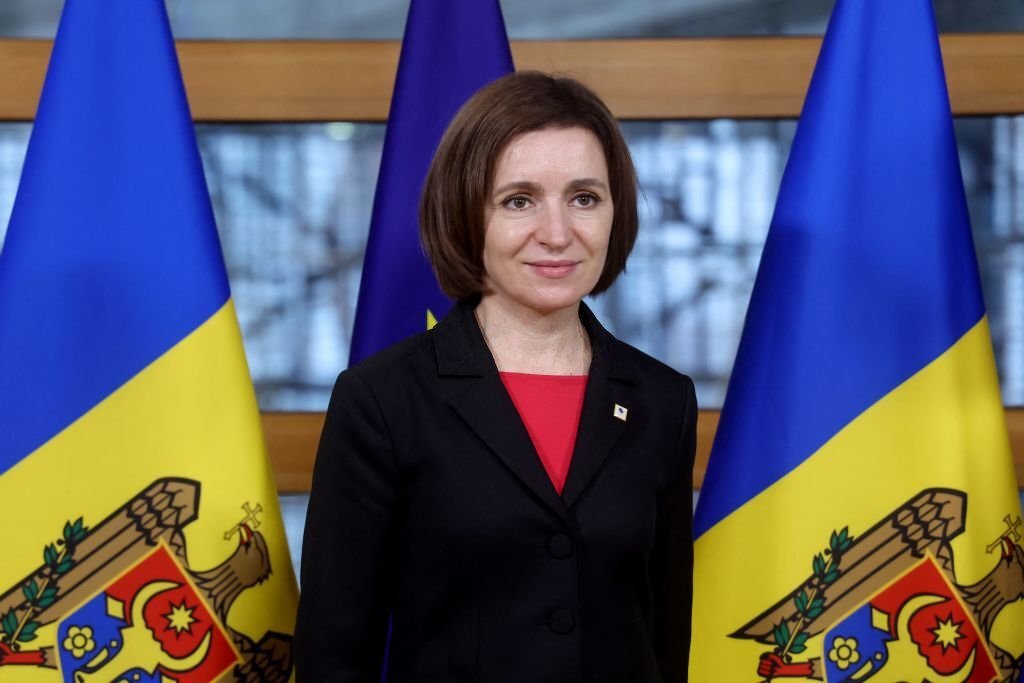European Central: Stability of Moldova at Risk
KENZO TRIBOUILLARD
Moldova’s president Maia Sandu is very pro-EU and aspires to be part of the west but is far from gaining EU membership for Moldova. Both Georgia and Moldova have officially applied for membership yet either is unlikely to achieve it any time soon. Before Sandu can work on achieving member state status, she must stabilize the country which is a tall order due to Putin’s invasion of Ukraine, which borders Moldova. The country has received hundreds of thousands of migrants and 100,000 have decided to stay within Moldova rather than move elsewhere, which means Moldova has accepted the most migrants when factoring in population size. This is overwhelming for Moldova as it is Europe’s poorest country based on its GDP pro capita. Donors from Europe and beyond will give 659 million euros in aid (equal to $718 million dollars). While some of the money is in the form of grants, part of the total are loans which will add pressure on the economy to recover in order to repay these loans, such as a 50 million euro loan from Germany. The loan has no terms restricting the use of the money.
There are concerns in Moldova that Russia may also still invade the nation depending on the outcome of the war in Ukraine. Moldovans are justified in these fears of a Russian attack considering that Transnistria, a pro-Russia region of Moldova that is trying to achieve independence hosts Russian troops. Moldovan Prime Minister Gavrilita currently believes there are no plans for these troops to make any maneuvers in Ukraine or Moldova, but their continued presence is not reassuring. President Sandu attempted to call on Russia to withdraw the 1,500 troops currently in Transnistria, to no avail. The same can be said about Georgia, which has Russian troops in two present regions who have claimed to be independent from Georgia since 1991.
Moldova’s economy is predicted to be seriously hurt by the war and cause the GDP to shrink. While member states of the EU are concerned about slower levels of growth during 2022 than previously predicted, Moldova’s economy may shrink between 3-15 percent. If Moldova’s economy shrinks by 15 percent, the aid currently promised will be dwarfed by the economic fallout. While Moldova’s economy has become predominately oriented towards EU countries, 15 percent of Moldovan exports still head to Ukraine, Belarus, and Russia annually. For apple orchards, the war has completely stopped normal shipments to Russia. In order to still earn a profit, apple prices have been reduced to attract new buyers such as Kuwait, but not enough have been to prevent a large surplus of apples sitting in storage. President Sandu hopes that the European Union will eliminate current tariffs on agriculture imported into the EU from Moldova which were currently agreed on under the Associate Agreement signed by the EU and Moldova in 2014 that went into effect in July of 2016. Only 40,000 tons of Moldovan apples can be imported into the EU, and all importation is first come first serve for sellers meaning Moldovan farmers need to compete to get their products to the EU first.
Remittances are vital to supporting the country, but 300,000 Moldovans who send remittances of the million who work abroad are employed in Russia. As there has been concern over the impact sanctions on Russia will have on workers, this concern extends to Moldovan workers currently working in Russia. In 2020, remittances were responsible for 15 percent of Moldova’s economy, making it the European nation most dependent on remittances. Remittances often make up 50 percent of the income of receiving families. Moldovans can also face difficulties accessing remittances family members and friends send back home if they do not live in a city. 43 percent of those who receive remittances have to receive them informally, through family or friends, or through bus drivers who travel between Moldova and Italy, France, Germany, and Russia. Between reduced exportation of food and potentially reduced remittances from Russia, it becomes easier to understand why Moldova’s economy can shrink so drastically this year.
Anna Baerbock, the Foreign Minister of Germany announced that Germany will help Moldova become energy independent from Russia. This is ironic considering Germany is in the same predicament and has refused to stop importing energy from Russia despite other EU member states doing the same under EU sanctions. Economists are concerned that Germany’s economy would contract if Germany were to stop importing Russian energy. Part of Moldova’s energy woes are caused by the country’s largest power generator being located in Transnistria, effectively controlled by separatists. There are calls for Moldova to be connected to the European Union electricity grid. Germany has also pledged to accept 12,000 of the current Ukrainian refugees staying in Moldova.
The problems in Eastern Europe will not be solved overnight and the war in Ukraine continues to complicate the situation. Besides threatening Ukrainian Sovereignty, Russia continues to squash the futures of other Eastern European nations such as Moldova and Ukraine. This is the European Union’s chance to challenge Russia’s ability to impede on the future of Eastern Europe. If the EU is successful and can bring Eastern Europe within its sphere of influence, then economic convergence in the future may be possible. If not, Eastern European economies may continue to stagnate and the vicious cycle of workers leaving to seek opportunities elsewhere will continue, leaving these nations with fewer workers to help create economic growth.

